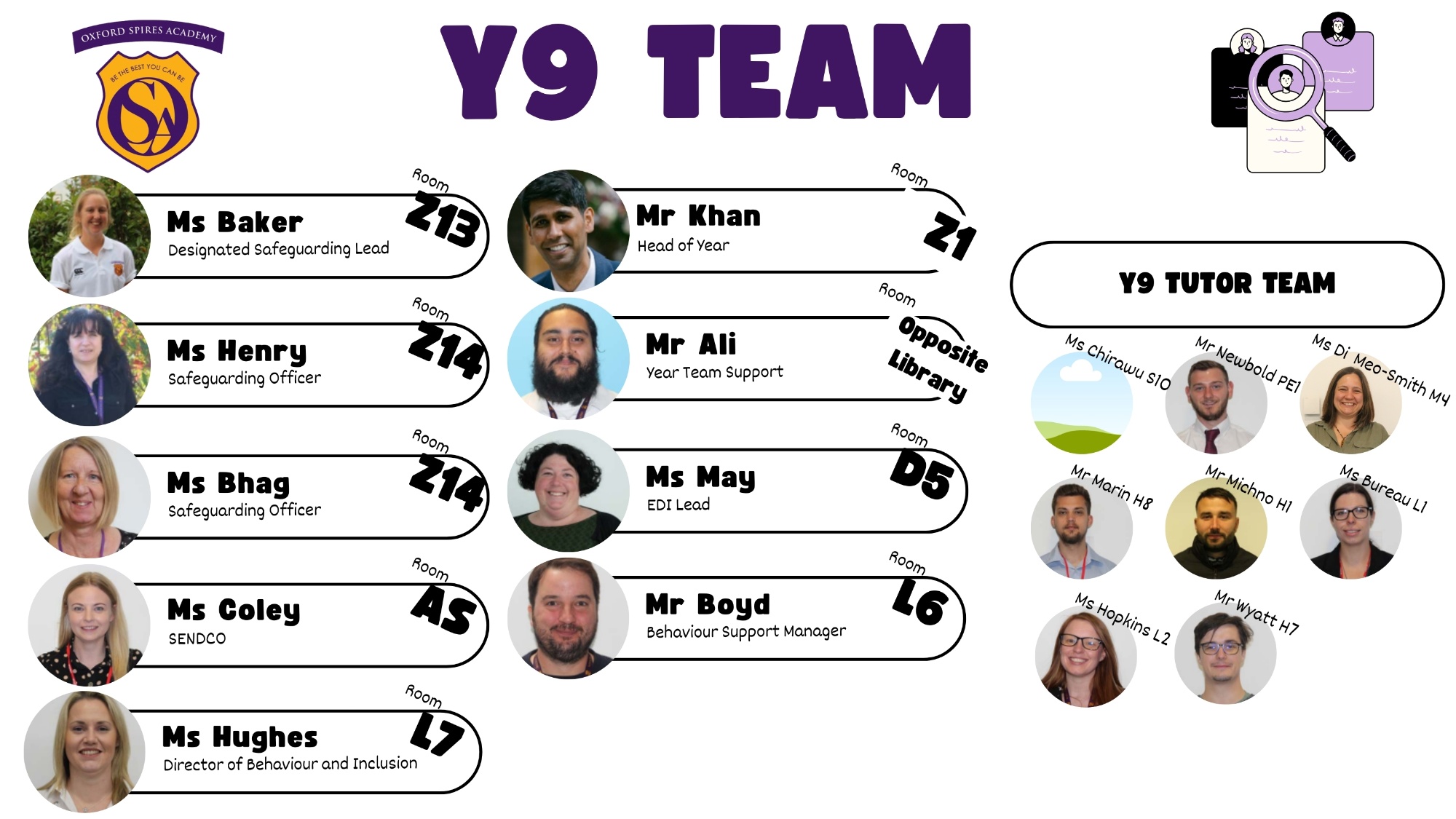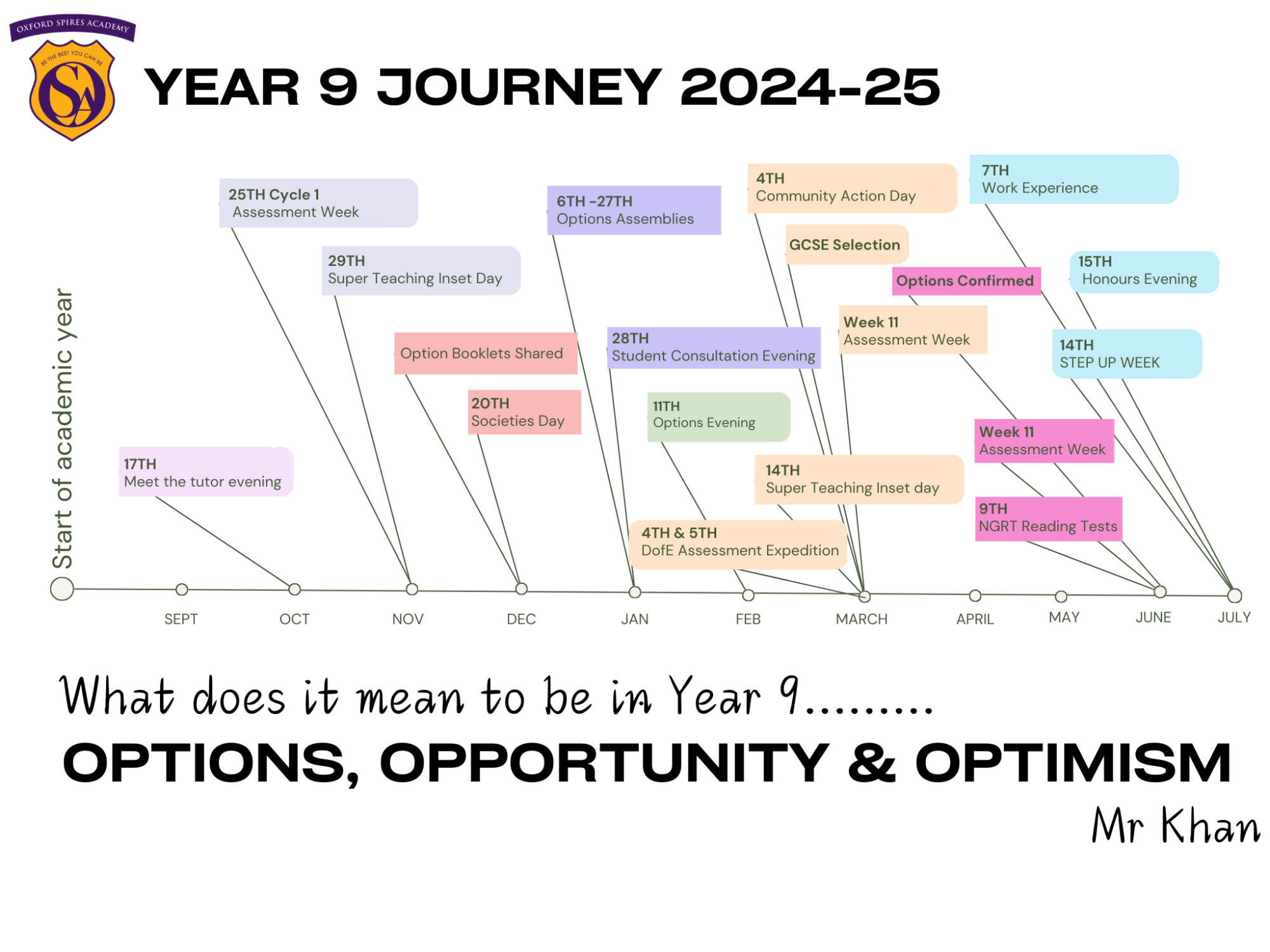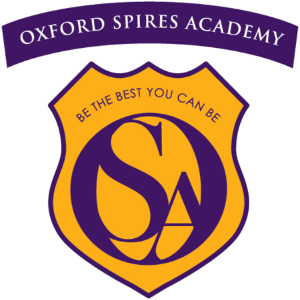Years 7-11
Year 9
This year is an important one for our students, as they begin the initial stages of their journey towards successful academic results. During the year, students with consult with teachers and parents to make the first refinements to their personalised curriculums ready for starting in Year 10. By taking ownership of their learning, Year 9 students are able to study their favourite subjects in greater depth and learn about new courses, such as Business or Media. Students are very lucky to have a wealth of options offered alongside their statutory subjects.
Year 9 is full of exciting opportunities inside and outside of the curriculum, and we expect our students to take full advantage of them; challenging and enjoying themselves with new skills and experiences. As the oldest members of our lower school, their leadership skills will certainly be encouraged.
Our aim is to develop mindful, ambitious young people who are able to make mature decisions with both themselves and the wider context in mind. Year 9 students will explore the world around them and ask questions which help them achieve and make progress. By aiming high, our students will ensure that they are on the right path to achieving their potential in the years ahead.
Year 9 Pastoral Team


Year 9 Curriculum Overview
We believe in a knowledge-centered curriculum which focusses on students acquiring ‘powerful knowledge’ (Young and Muller, 2013, p. 245) across a range of academic disciplines to ensure students have access to a broad and balanced education. Within a knowledge centered curriculum, subjects are taught at gradually increasing levels of complexity leading to deeper knowledge and understanding. We are ambitious for all our students. We have selected the most relevant and important knowledge to be taught across Year 7-9 in order to prepare our students to become successful leaders of their futures. It will also support students to make informed choices about their GCSE study.
Year 9 assessment
Schools are places of learning and achievement. We measure our success by our students’ success. In an ever-growing complex world, our children need the qualifications, skills and tenacity to live happy and fulfilled lives.
In week 11 all students will sit an assessment in each taught subject area. This allows us to measure how well our students are learning the taught curriculum. These results will be reported home to parents and carers.
- All students in Year 9 will have three assessments across the academic year.
- In week 9 of each cycle students will receive a timetable of when each assessment will be held this will also be published below:
Supporting your child in Year 9
By Year 9, your child should be well on the way to independence, both in terms of learning and self-management. It’s important that they are able to take responsibility for themselves and learn from their mistakes, and this is something parents and carers can really help them with. We too will be encouraging a heightened sense of responsibility in our Year 9s, who are the senior students at our lower school.
We also recognise that, by Year 9, the issues they may be facing become more serious. So we offer a number of workshops and sessions to help them navigate aspects of teenage life such as drug awareness, stress management and safer use of social media and the internet. We will let you know when these are taking place, as they can be a useful trigger for your own conversations about these issues; however awkward you may find it, it’s always good to talk.
From a learning perspective, Year 9 students will be need to be thinking about their Year 10 options towards the middle of the year as they build their final GCSE portfolio. If they need any help deciding which courses to pursue, you could suggest that they speak to their class teachers; we will also invite you and your child to a GCSE choices evening before final decisions have to be made.
As a family, you might also find it useful to familiarise yourselves with the changes to the GCSE grading system; you can find a bit more about it on the government’s website Please also reassure them that as long as they do their best, and work hard, they will achieve what they deserve.
The OSA Cycle
- The academic calendar is split into three cycles of learning.
- Each learning cycle is twelve weeks long.
- Students will following a carefully sequenced and ambitious curriculum during weeks 1-10.
Week 11 - Assessment Week
- All students will sit a formal assessment in week 11.
- Student achievement will be reported back to parents and carers.
Our assessment principles:
- Students are tested on the content taught from the cycle and detailed in the Scholars Guide
-
Section A & B : Knowledge - teacher will read the assessment aloud and using a visualiser
Section A will focus on knowledge taught from the cycle of learning just completed. Section B will focus on knowledge taught in previous cycles in that academic year
- Section C : Application - students will answer independently
Week 12 - Super Teaching Week
What is super teaching week?
Super Teaching Week is where teaching teams use the data from assessment week (Week 11) to identify gaps in knowledge and common misconceptions. Teachers then deliver lessons that target these areas to ensure mastery and edit their schemes of learning for future year groups so that we can teach it BETTER. Each lesson is done in purple pen to show that this is development work and we use a summative sticker in students' books for students to mark the end of each Cycle's learning.
Why is super teaching week important?
At Oxord Spires we passionate that no child should be left behind and Super Teaching Week is the vehicle we use to explicitly ensure all students from all backgrounds, in all subjects, in all classrooms have the opportunity to master and develop their learning. We also believe that no scheme of learning is perfect and we enjoy reflecting and changing our practice for our students. ‘Getting better is the exciting part’.
The OSA Scholars Guide
Scholar’s Guides are our way of communicating our knowledge rich curriculum to parents and carers and a tool to complement the work done in classrooms every day. Scholar’s Guides develop students to master core knowledge and skills quickly so that teachers can push them further later.
By making knowledge and skills clear via Scholar’s Guides, students and parents can support learning from home, especially when preparing for the week 11 assessments.
Scholar’s Guides can be used by SEND departments and teaching assistants to preteach students who may require it and to target interventions and re teaching effectively. Some students may require more support and scaffolding but Scholar’s Guide means that every student has access to ambitious lessons planned from an aligned, sequenced curriculum and we avoid denial of knowledge!
